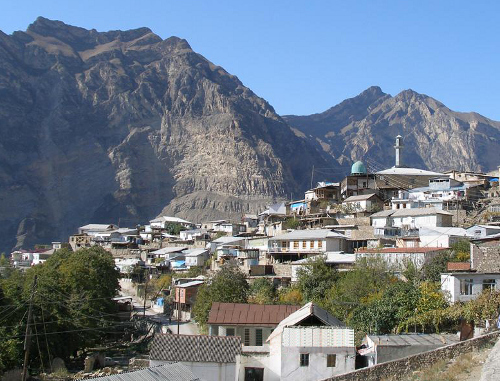
Having Lost Population’s Trust, Dagestan’s Government Finds It Hard to Make a Comeback
Publication: Eurasia Daily Monitor Volume: 10 Issue: 149
By:

On August 7, the acting head of Dagestan, Ramazan Abdulatipov, and other republican officials met a group of residents of the embattled Dagestani village of Gimry. The Dagestani government proposed a deal with the villagers’ leaders that should end the settlement’s suspended status. The authorities bluntly offered a combination of “carrots and sticks” to the residents of Gimry, which has been the scene of lengthy special operations several times in the past years. In April, during the latest special operation there, the security services even resettled the entire population of the village, several thousand people, in a shantytown nearby, under the pretext of fighting the radicals in the village. The official website of the Dagestani government conveniently shifted responsibility for the hardship of Gimry’s civilian population onto the militants. “The militants were given the chance to surrender, but they did not do so, thereby endangering the civilians,” the website of the government news agency said, thinly disguising the government’s collective punishment strategy (https://riadagestan.ru/news/president/ramazan_abdulatipov_gimry_eto_obshchedagestanskoe_dostoyanie/).
The candid words of the government officials at the meeting with the Gimry residents illuminated the challenges that the government in Dagestan faces and the remedies it has for dealing with the insurgency in the embattled village. Abdulatipov rebuked the Gimry residents, along with those of other villages such as Gubden, for failing to serve in the local police. “We tell them, let us accept 20 people to work [as police officers],” he said. “We will give them a salary. Defend yourself, your families, relatives and villagers. They do not take this opportunity because they are scared. The bandits will be winning if we turn out to be cowards. Why should Russian soldiers or others be restoring order in your home and not you, yourselves? People come to you to deliver you from the bandits and you are firing shots in their backs. Then you come with complaints that you are not given proper treatment” (https://riadagestan.ru/news/president/ramazan_abdulatipov_gimry_eto_obshchedagestanskoe_dostoyanie/).
Gimry, an Avar village in Dagestan’s mountainous Untsukul district, has long been one of the hotbeds of the insurgency. In April, the security services carried out a mass punitive action in the village after killing three suspected militants. The village’s residents were moved to a shantytown for several weeks and after they were allowed to return to their homes, they found that 10 homes had been burned down and 44 others damaged. Over 450 families in the village, virtually the whole population, reported various losses (https://www.regnum.ru/news/kavkaz/dagestan/1692893.html).
Currently the government of Dagestan is apparently proposing a deal that would involve the surrender of rebels of the village, on the one hand, and government financial incentives, on the other hand. The whole discussion shows why democracies tend to be less violent than non-democracies. If elections and other democratic mechanisms worked in Dagestan, the people who have the real authority in Gimry would be in power and, therefore, be able to control the situation in the village. However, in the current situation, when political participation is severely restricted in Dagestan, the republican government does not even have a proper channel to speak to the people it should be talking to.
The passionate admonition made by the head of the Federal Security Service (FSB) branch in Dagestan, Andrei Konin, is also instructive. Konin said that 20 residents of Gimry were fighting in Syria, participating in killings and posting videos about their actions online. Attempting to hold the high moral ground, he said: “Hypocrisy and indifference has become part of the mentality of the local people [in Gimry]. The so-called Sharia court worked for a long time. And what kind of questions did it resolve? Who to kill and what for, how much money to take and how much a kidnapping costs…Where was the healthy part of the population during this time?” (https://www.regnum.ru/news/kavkaz/dagestan/1692893.html).
Offering of “carrots and sticks” to a village of several thousand residents demonstrates, apart from other things, the continuing weakness of the republican government. Broken government institutions cannot function without at least some trust from the population. Instead of promoting trust, however, what we see on the government side in Dagestan is the wielding of power and an attempt to buy people’s confidence. Instilling fear in the disillusioned population and paying them money may seem like a suitable, quick fix for Dagestan’s security issues, but in the long run it is likely to backfire, resulting in even less public trust and greater levels of violence.
On August 3–4, rumors about Ramazan Abdulatipov’s possible resignation spread on the Internet. The website that started the rumors belongs to Abdulatipov’s own son, thus many observers decided it was a public relations move aimed at pressuring Moscow to pay more attention to the acting head of Dagestan. The reports stated that President Vladimir Putin was refusing to meet Abdulatipov and that this signaled the Dagestani leader’s resignation was imminent. Abdulatipov has been in power in Dagestan as the acting head of the republic since February.
In September, the appointment procedure for the republican head is scheduled to take place in Dagestan. So far, there have been no credible indications that Moscow does not want Abdulatipov to become the republic’s full-fledged head. However, some observers perspicaciously interpreted the rumors of Abdulatipov’s resignation as possible plans in Moscow to install direct presidential rule in Dagestan. Observers said that a large terrorist attack could become a convenient excuse for such a step. They also point out that a “soft” version of direct Russian rule is already being implemented in Dagestan, as non-ethnic-Russian Dagestanis in governmental agencies are being replaced by ethnic Russians, often from the Russian security services (https://chernovik.net/content/politika/v-ozhidanii-putina).
The political situation in Dagestan appears to be highly fluid, which may result in even greater security challenges in the republic. The solutions to the challenges of the republic advanced by the authorities are evidently not radical enough to have any significant effect on the situation in Dagestan. Moscow’s virtual ban on holding proper elections in the republic in September 2013 leaves little hope for improvements in the most violent territory of the Russian Federation.




